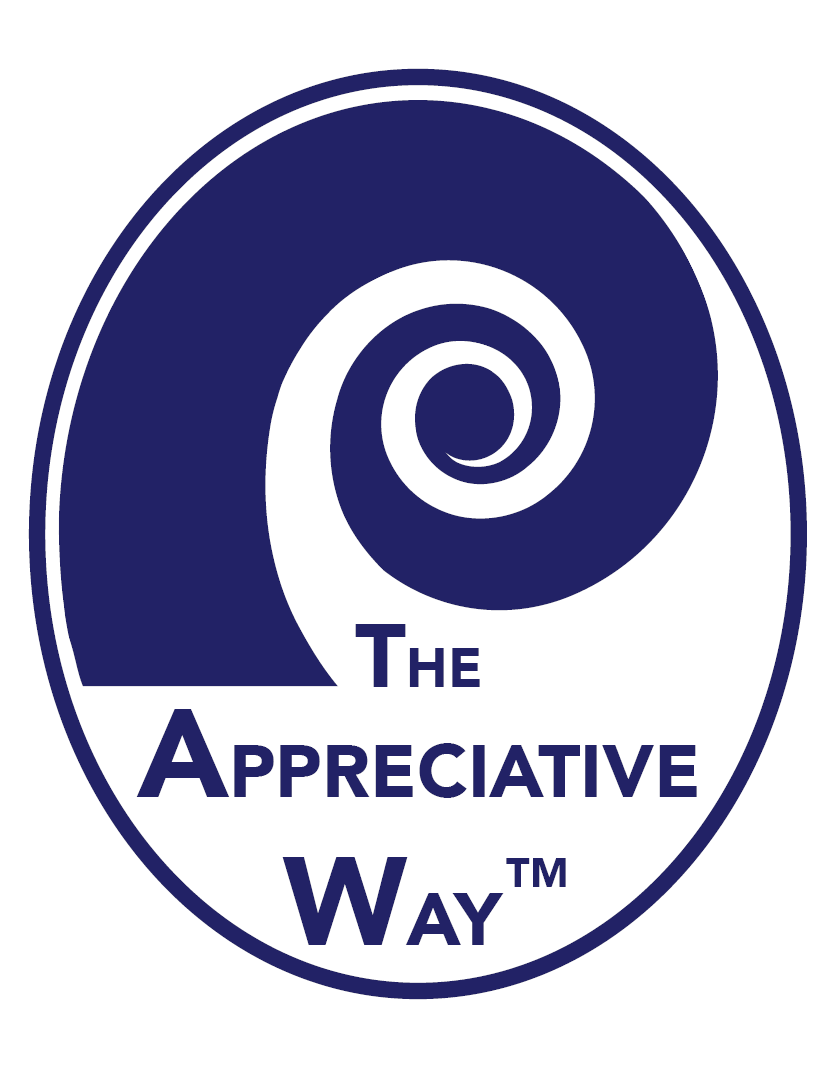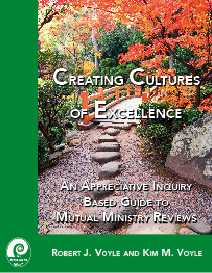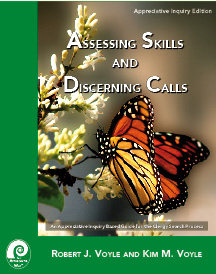

Creating Cultures
of Excellence
Appreciative Inquiry Based Guide to Mutual Ministry Reviews
- Templates and Worksheets
- For Congregations
- Individual Performance
- Coaching Strategies
Clergy Search Resource
Over 380 pages of detailed strategies to Assess clergy skills and Discern Calls.
Now available as an online library.
The Clergy Coach
The Rev. Dr. Rob Voyle is a leader in the development and use of appreciative coaching in his work with clergy.
Stay Connected
Receive The Appreciative Way our Free Email Newsletter
and receive advance notice of future programs.
Privacy: We never rent, sell, or share your email.
Creating Cutures of Excellence
An Appreciative Inquiry Guide to Mutual Ministry Reviews
|
Creating Cultures of Excellence |
|
| Webinar: Discover the Art of Giving Feed-Forward not Feed-Back |
Mutual Ministry Valuations
Mutual Ministry Valuations (MMV) provide an opportunity for the entire ministry community to come together and discover what is valuable about their mutual ministry. While many congregations have used a process known as Mutual Ministry Review the MMV process is distinct in that using appreciative processes we seek to discover and build on the things that give value to a congregation's ministry. In the valuing process we do not seek to discover what has not happened nor who was to blame for something not happening because it is impossible to build a future on what hasn't happened. In the valuing of a congregation's ministry we find the seeds of future ministries and the resources required to accomplish them.
See Article: The Folly of Annual Performance Reviews
The valuing process is also used to help people put the dagger of constructive criticism back in its scabbard. Have you ever noticed that the term " constructive criticism " is generally used by the criticizer and even when solicited often leaves you feeling stabbed rather than inspired to make changes? In contrast, we have continually found that a valuing process provides the inspiration to make continual improvement in the direction of increasing value. In this process we do not avoid problems. Rather we seek to establish a mindset that enables solutions to be discovered, for we have also found that problems cannot be resolved from the mindset that created them. Likewise we do not gloss over poor performance, rather we are seeking to create an environment that will energize performance in the direction of enhancing value.
Below is a comparison of the questions that are traditionally asked in Mutual Ministry Reviews and in a Mutual Ministry Valuations.
Comparison of Traditional and Valuing Ministry Reviews
Parish Goal: To revitalize and re-energize the 10:00 am worship service.
| Traditional Ministry Review | Mutual Ministry Valuation |
|---|---|
|
How are we doing at accomplishing this goal? How could the rector be more helpful in accomplishing this goal? How could the Vestry be more helpful in accomplishing this goal? |
Tell me a story of a time in the last 12 months when you have felt energized and enlivened by our 10:00 am worship service. What made this service particularly inspiring for you? What do we need to do to provide more opportunities for this type of inspiring worship? |
Analysis of the Methodology
The traditional method is vulnerable to a wide variety of responses that may or may not be helpful in either celebrating accomplishments or in planning for the future. If the worship has been revitalized the review will probably be positive and may lead to some helpful information and enthusiasm to continue the worship development. On the other hand if very little has been accomplished, even if much effort has been expended the review is likely to result in blaming and judgment of those supposedly responsible for the failure. The two subsequent questions of the rector and vestry are also likely to provide focus for the blame and lead to defensiveness. In this environment little energy will be found to create inspiring worship in the future. The subsequent changes that are made to reach the goal will in all probability fail because they are made from a motivation of defensiveness and fear to avoid further judgment rather than a loving desire to provide inspiring worship.
In contrast the valuing approach seeks to discover those times when the worship has been inspiring. Even if the performance has been poor and the goal largely unmet the people are focusing their attention on the desired goal and discovering even the rare occasions when it has occurred. At the same time these instances, even if few in number, are providing valuable information on what needs to be done in order for parishioners to be inspired in their worship.
Beyond the simple gathering of information the telling of stories in the valuing process enables a congregation to hold in their corporate consciousness examples of how they function at their best. This corporate consciousness of valued best experiences is the fertile ground upon which the Spirit of God can grow the future church.
CLI faculty are available to assist in developing mutual ministry valuation resources. We do not provide a " canned " process as we have found that the valuing process needs to be tailored to the specific needs of the congregation. We do however offer the following recommendations for those engaged in a review and valuing of a congregation's ministry. Most of these recommendations also apply to more traditional ministry reviews.
Things to Consider When Conducting a
Mutual Ministry Valuation
- A ministry that is valued will be easily sustained whereas a ministry that is not valued will wither and die.
- An MMV is not a performance appraisal of the pastor or priest, it is the valuing of the entire congregation's ministry.
- For clergy seeking to review and develop their personal ministry we recommend a coaching model that provides opportunity for 360 degree assessment and ministry development goals. Please refer to the coaching page for more information on innovative strategies for personal and professional growth.
- MMVs or ministry reviews are not a method of conflict resolution. While MMVs can be conducted amidst creative tensions, they do require a degree of trust and acceptance and are entirely inappropriate when factions within a congregation are seeking the removal of personnel.
- When conducting MMVs it is preferable to use a neutral third person as a facilitator. One of our goals is to train parish clergy in the appreciative philosophy and process so that they may provide MMV facilitation for each other within their dioceses or regions.
- If you plan on using a facilitator involve them in the entire planning and process and not just in the final review of the findings.
- The most effective MMVs occur after a clear set of goals, with plans for accomplishing the goals, time lines and mutual expectations have been clearly articulated to the entire congregation.
- The most damaging ministry reviews occur when there are none or poorly articulated goals and plans. In these instances ministry reviews are too vague to be helpful or are potential conflict igniters when they degenerate into a blaming game for poor performance.
- If the congregation doesn't have a well articulated mission and strategic plan rather than trying to conduct an MMV we recommend that the parish engage in a strategic planing process. We have found that a parish wide appreciative inquiry process to be an effective method of developing both the mission and the commitment and enthusiasm to carry it out. Please see the Appreciative Inquiry pages for more details.
- The questions you ask will determine the answers you get.
Some questions just shouldn't be asked. For example: Consider a congregational survey question in which the parishioners are asked: "In the past year when has the Pastor not been available to you?" This question will never allow discovery of how available or compassionate the Pastor has been. Even the most available pastor in the universe will fail this test. A much better question is the positive one: "In the past year when has the Pastor been available to you?" Even if the pastor has been rarely available to the congregation the positive question enables the people to gather the examples of availability and then they can ask. "Now, what do we need to do so that the Pastor can do more of the things that enable him or her to be available?" - Ask questions that help you discover what needs to be accomplished and not why something wasn't accomplished. Seek to catalogue valuable accomplishments rather than failures, for the failures generally will only tell us what not to do but will not necessarily inform us what to do.
- Just conducting a survey and tabulating the results is not an MMV. The results are only important in as much as they help a congregation hold in mutual consciousness the things that are valuable about belonging to the congregation. Mutual story telling is more effective than surveys for changing congregational mindsets.
- Effective Ministry will result in enjoyable MMVs and lead to a whole lot of celebrating and thanksgiving. Compare the Seventy returning to Jesus after being sent out on mission. Lk.10:1-24


